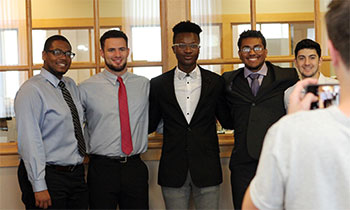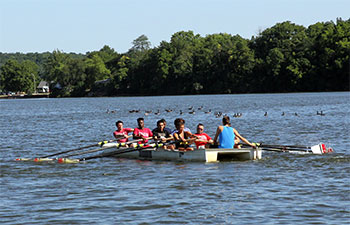Wabash College has received a $1 million grant from Lilly Endowment Inc. through its initiative, Charting the Future for Indiana’s Colleges and Universities.
The grant will help Wabash strengthen efforts to increase opportunity for first-generation college students, Pell Grant recipients, and Black, Latino and Native American students who are currently underrepresented in higher education. Wabash expects these students will make up the majority of college students nationwide in coming years.
 “Support for the WLAIP comes at a critical time,” said Wabash President Scott E. Feller. “While the national conversation among higher education leaders is on how the pandemic is reducing opportunities to advance college degree completion among new majority students, Wabash will continue our bold moves focused on student success. Lilly Endowment’s Charting the Future initiative gave us the opportunity to make clear that Wabash’s future rests on providing a transformative educational experience to young men who will go out and change their families, their communities, and our world.”
“Support for the WLAIP comes at a critical time,” said Wabash President Scott E. Feller. “While the national conversation among higher education leaders is on how the pandemic is reducing opportunities to advance college degree completion among new majority students, Wabash will continue our bold moves focused on student success. Lilly Endowment’s Charting the Future initiative gave us the opportunity to make clear that Wabash’s future rests on providing a transformative educational experience to young men who will go out and change their families, their communities, and our world.”
The funding will support the innovative Wabash Liberal Arts Immersion Program (WLAIP) for three more years. Now in its sixth year, WLAIP brings to campus each summer 30 students from diverse economic, social, and cultural backgrounds for an intense month-long summer experience designed to prepare them for success during their undergraduate years. The program has increased year-over-year retention and improved the academic engagement of young men during the freshman year experience.
The Charting the Future grant will directly fund the on-campus summer program and the second-summer internships, which takes place between freshman and sophomore years. It will support peer mentorship specifically geared toward student success: Peer Mentors and Peer Writing Consultants in the summer program and Supplemental Instruction Leaders during the school year.
“The WLAIP has become a flagship program on our campus, and we have been pleased to see students of color, first-generation students, and students from low- and moderate-income families thrive at the College,” said Jill Lamberton, Senior Associate Dean of the College and Associate Professor of English. “They have taken on more leadership roles across the College. They have made us a better, more inclusive place.”
The goal is to strengthen the connections for WLAIP students with professors, academic support, mental health support, financial literac y, and our alumni network. Such connections have proven to be influential in increasing student retention. The internship after their freshman year helps students make connections off campus as well.
y, and our alumni network. Such connections have proven to be influential in increasing student retention. The internship after their freshman year helps students make connections off campus as well.
“The WLAIP has played a pivotal role in my transition to college,” said Davionne Garrett ’22, a WLAIP participant. “The program allowed me to get an early taste of the time commitment and work load I would expect. From writing a proper rough draft to organizing my calendar, the WLAIP offered me the skills needed to succeed. More importantly, I bonded with 30 guys who shared very similar worries and fears about college. The opportunity to forge relationships with some of my future Wabash brothers and staff members was essential to finding my comfort zone.”
Additionally, the grant provides three years of funding for 15 Faculty Pedagogy Fellows. These are current faculty who are chosen to develop new courses or revise current courses focused on equity, inclusion, and social justice. Faculty may apply for a stipend or course release to allow time to implement the new or revised courses.
The grant also provides funding for faculty, staff, and administrators to attend workshops and training sessions at nationally-recognized centers that promote equity and racial justice on college campuses. Wabash personnel will be able to design projects to address campus-specific areas where the campus community can be more equitable and inclusive to all students.
“This support allows us to continue our focus on academic success through the WLAIP, and helps to improve our campus climate, policies, and course offerings so that Wabash meets the needs of the next generation of students,” said Dean Lamberton.
Lilly Endowment launched its three-phase Charting the Future initiative in late 2019 when it invited all 38 of Indiana’s accredited public and private colleges and universities to apply for planning grants to help them consider what it would take to improve their efforts to educate students and prepare them for successful futures while thoughtfully examining the long-term financial sustainability of their institutions. This implementation grant was awarded under the second phase of the initiative. Grants under a third phase, which is competitive, will be awarded in 2021. Those grants will support collaborative efforts that seek to have large-scale impact on the ability of higher education institutions in Indiana to fulfill their educational missions.
Lilly Endowment Inc. is an Indianapolis-based private philanthropic foundation created in 1937 by J.K. Lilly, Sr. and his sons Eli and J.K. Jr. through gifts of stock in their pharmaceutical business, Eli Lilly and Company. Although the gifts of stock remain a financial bedrock of the Endowment, it is a separate entity from the company, with a distinct governing board, staff and location. In keeping with the founders’ wishes, the Endowment supports the causes of community development, education and religion. The Endowment funds significant programs throughout the United States, especially in the field of religion. However, it maintains a special commitment to its founders’ hometown, Indianapolis, and home state, Indiana.